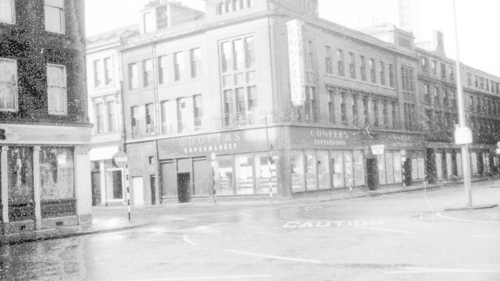Cooper & Co - Times Past

While lots of food shopping is now organised online, many readers might recall an altogether different retail experience at the renowned grocery chain, Cooper and Co.
Although Coopers was in many respects a Glaswegian institution, its founder was an Englishman, Thomas Bishop. Born in Carlisle in 1846, Bishop worked as an office boy in Joseph and Edward Tetley’s tea business and later went on the road as a travelling tea salesman. His area encompassed most of Scotland and the contacts he made at this time proved useful in starting his own business.
Bishop had family connections to Hamilton and settled in the Lanarkshire town. In 1871 he married a local girl, Elizabeth Henderson, and, in the same year, established his new business venture: Cooper and Co.
The company was named after Bishop’s aunt Lilias Cooper, who provided much of the start-up capital. By way of further tribute, an illustration of a cooper and barrel adorned the new grocery’s packaging and became the company logo.
Although he was only 24, Bishop had an extensive knowledge of the tea trade in Scotland and was an expert tea taster and blender. Cooper and Co’s first premises opened in a grand warehouse building on Howard Street designed by Alexander ‘Greek’ Thomson, which no longer stands. The flagship city centre site was a great success and was quickly followed up with new stores on Sauchiehall Street and Great Western Road – both bustling, growing locales.
Coopers sold a range of grocery staples and described itself as “high class provision merchants and Italian warehousemen”. It also carried many exotic goods including a revolving coffee roasting machine, which might make today’s caffeine fanatics froth with envy.
The company expanded rapidly - by 1895 it had 31 branches throughout Scotland and England and employed more than 2000 people, with large warehouses in Liverpool and London.
This success was driven by a twin focus on innovation and quality. Bishop introduced the telephone and electric lighting in his shops in the 1880s and, to improve the speed of service, brought in a cash container that ran along an overhead wire to deliver change and receipts to customers.
He also issued guidance booklets to staff that covered various aspects of the grocery trade. One called Service and Selling set out the core demands of employees: “The foundation of your personal service must be knowledge of your trade and the desire to use it intelligently… a good grocery assistant must know his commodities, must be able to calculate mentally with quickness and accuracy, and must take his share of the regular manual work inseparable from our trade.”
Thomas Bishop died in 1922, just a month after his wife. His company was taken over by the Fine Fare group in the 1950s and continued to operate until the 1980s, when most of the stores were closed.
All that remains of Coopers today is a bar of the same name, which occupies its beautiful former store on Great Western Road.
